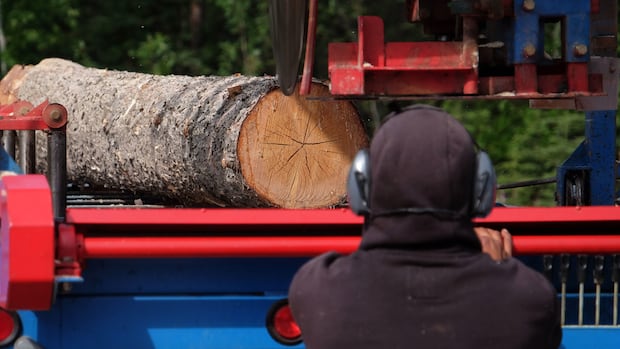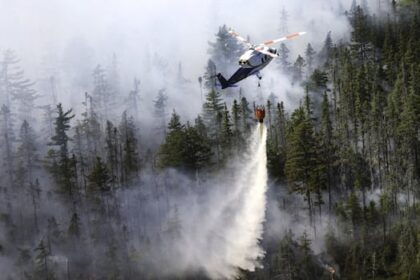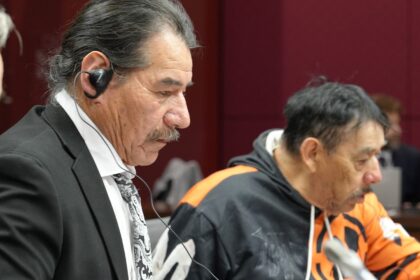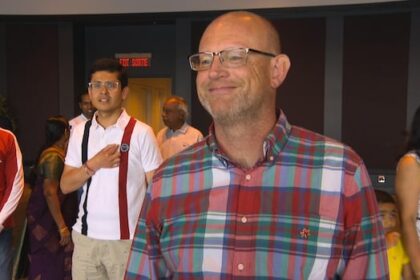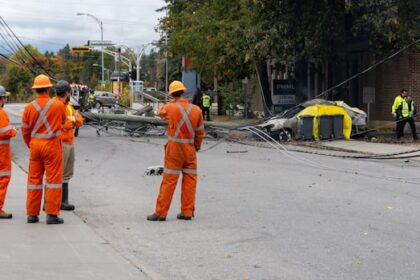British ColumbiaThe looming closure of a lumber mill in central B.C. is highlighting the ongoing challenges in accessing an economically viable timber supply — with one academic urging an “emergency response” to help the forestry industry.Recent closure of West Fraser mill in 100 Mile House highlights ongoing challenges for forestry in B.C.Akshay Kulkarni · CBC News · Posted: Nov 24, 2025 9:00 AM EST | Last Updated: 2 hours agoListen to this articleEstimated 5 minutesThe audio version of this article is generated by text-to-speech, a technology based on artificial intelligence.A looming closure of a B.C. forestry mill is highlighting challenges with accessing economically viable timber supply in the province. (CBC)The looming closure of a lumber mill in central B.C. is highlighting the forestry industry’s challenges in accessing an economically viable timber supply — with one academic urging an “emergency response” to deal with it.West Fraser Timber Co. announced it would shut its mill in 100 Mile House by the end of the year, saying it couldn’t reliably access enough economically viable timber either locally or further afield. Its closure will put more than 165 people out of work as a result.B.C.’s forestry industry has taken major hits over the last few years, as escalating U.S. duties on softwood lumber imports have piled atop challenges like a major beetle infestation and wildfires, leading to thousands of jobs lost. But longtime forestry worker Sven Binker of 100 Mile House says he’s confused by West Fraser’s justification for shutting down the mill.The supply of fibre and wood in the area is “plentiful,” says Binker, who was previously laid off when forestry company Norbord suspended its mill operations in 100 Mile House.WATCH | MLA says mill closure is devastating in 100 Mile House: Mill closure in 100 Mile House ‘a devastating blow,’ says local MLAThe community of 100 Mile House is reeling after West Fraser Timber announced it will shutter the local mill by the end of the year, affecting 165 jobs. BC Today host Michelle Eliot spoke with B.C. Conservative MLA for Cariboo-Chilcotin Lorne Doerkson, who said the loss will be felt across the entire South Cariboo.”I’ve lived here a long time in 100 Mile, and we have a lot of forests around here, you know?” he told CBC’s Daybreak Kamloops.”For me to kind of swallow that it’s, you know, high cost of having to get logs from from further places [leading to mill closures] that, that seems a little bit strange to me.”LISTEN | Binker talks about impact of mill closure:Daybreak Kamloops9:48Worker reflects on mill closure in 100 MileA longtime forestry worker shares how a previous layoff shaped his outlook as West Fraser prepares to shut its 100 Mile House millAll hands on deck, prof. urgesUniversity of B.C. forestry professor Gary Bull explained that to have an “economically viable fibre supply,” it needs to make sense financially for a company to transport logs from a forest to its mill. And the viability is complicated by the fluctuating price of lumber. “The challenge is that you have huge lifetimes between the planning, when you’re going to harvest the tree and when it actually gets processed in the mill, and that can be up to two years or more,” he said.WATCH | U.S. trade war and its impact on lumber:Separating fact from fiction in the U.S.-Canada softwood lumber trade warThe lumber mills on Mitchell Island along the Fraser River are still bustling, but there are worries they could be in trouble. Last Friday, the U.S. Department of Commerce announced a big hike on duties for Canadian softwood lumber. Other anti-dumping fees were announced in July. That means Canadian lumber is now subject to duties of more than 35 per cent. We speak with Kevin Mason, the managing director of ERA Forest Products Research, who provides some context on the ongoing trade dispute.Bull estimated that insect outbreaks and wildfires have contributed to a 50 to 60 per cent reduction in available fibre near 100 Mile House over the last few years.”I understand that West Fraser was trying to go outside to other areas, but with the tariffs then adding a huge increase in costs, it made it economically unviable to do that,” he said.”So it’s a very challenging situation and I think it almost requires an emergency response.”An academic is urging an “emergency response” to deal with fibre supply. (Chris Corday/CBC)Bull said he’s urging an “all hands on deck” response from provincial and federal officials, saying there should be a lot more energy put into finding viable solutions for the mills still running in B.C.He praised a recent initiative from the Brazilian government called the Tropical Forests Forever Facility, which he says finances a change to how forest management is done.”Canada as a whole also needs something like a Canadian Forest Forever Facility, to figure out how to attract investment dollars back into the forest and manufacturing because they’re so critical,” Bull said.Minister looks to diversifyB.C. Forestry Minister Ravi Parmar recently returned from a trade mission to South Korea and Japan as he looks to find new buyers for B.C. forestry products.The United States has long been the single largest market for B.C. lumber exports, representing over two-thirds of the market for the approximately $10-billion industry — but it recently imposed a 45 per cent tariff rate on imported lumber products.WATCH | Parmar says U.S. can’t be trusted anymore:B.C. forestry minister says U.S. can no longer be trustedAfter U.S. President Donald Trump imposed punishing tariffs on imported lumber, B.C. Forests Minister Ravi Parmar says the country can no longer be the principal export destination for the province’s lumber sector. He says the province is setting up a forest trade office in the U.K. to diversify its exports in the region.”The message that I’ve delivered … to people in Japan and South Korea is that our relationship with the United States has changed forever,” Parmar told CBC’s Daybreak North.”Even if we reached a deal on softwood tomorrow, we have to diversify. We can never put forestry workers in this position ever again.”Parmar says there needs to be an injection of federal cash to shift the lumber sector away from a boom-and-bust cycle to one of long-term certainty.He said that the province’s chief forester was working to set out allowable cut areas in B.C. — and that while fibre supply was going down, economically viable fibre was still out there in the province.”There’s incredible companies doing this work on the ground, and we’re working very hard with them to do this important work, to look inside First Nations as well,” he said.”I think if there’s one thing that I hope to be able to accomplish in my time as minister of forests is for us to become better stewards of our land. I think we got a lot of work to do,” he added.WATCH | Parmar wants more federal support:’We’re still waiting,’ says B.C. minister on Ottawa’s promised lumber supportsB.C. Forests Minister Ravi Parmar says his province’s softwood lumber industry is ‘still waiting’ for $1.2 billion in support promised by the federal government. “When the federal government seems more focused on auto and on steel and other sectors and not forestry, I think you can understand our frustration in B.C.,” Parmar tells Power & Politics.With files from Daybreak Kamloops and Daybreak North
Why a lack of access to timber is leading to B.C. mill closures, job losses
